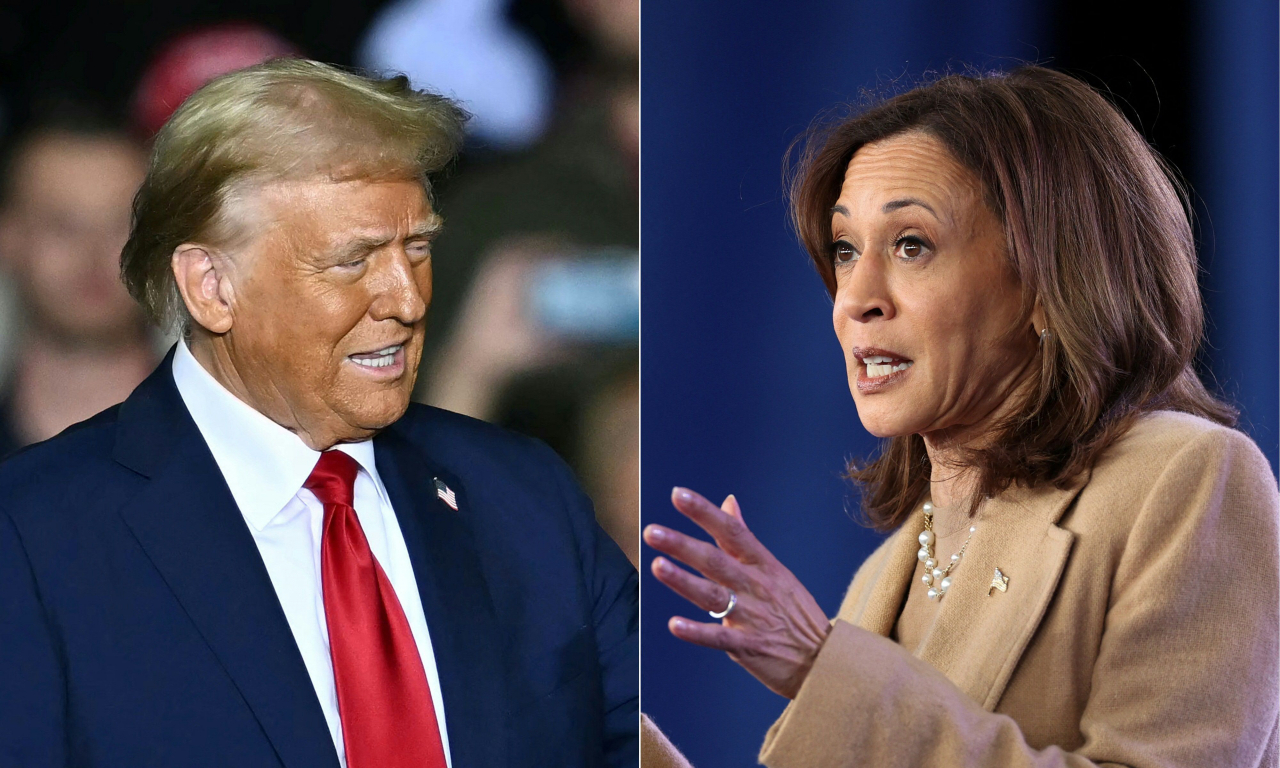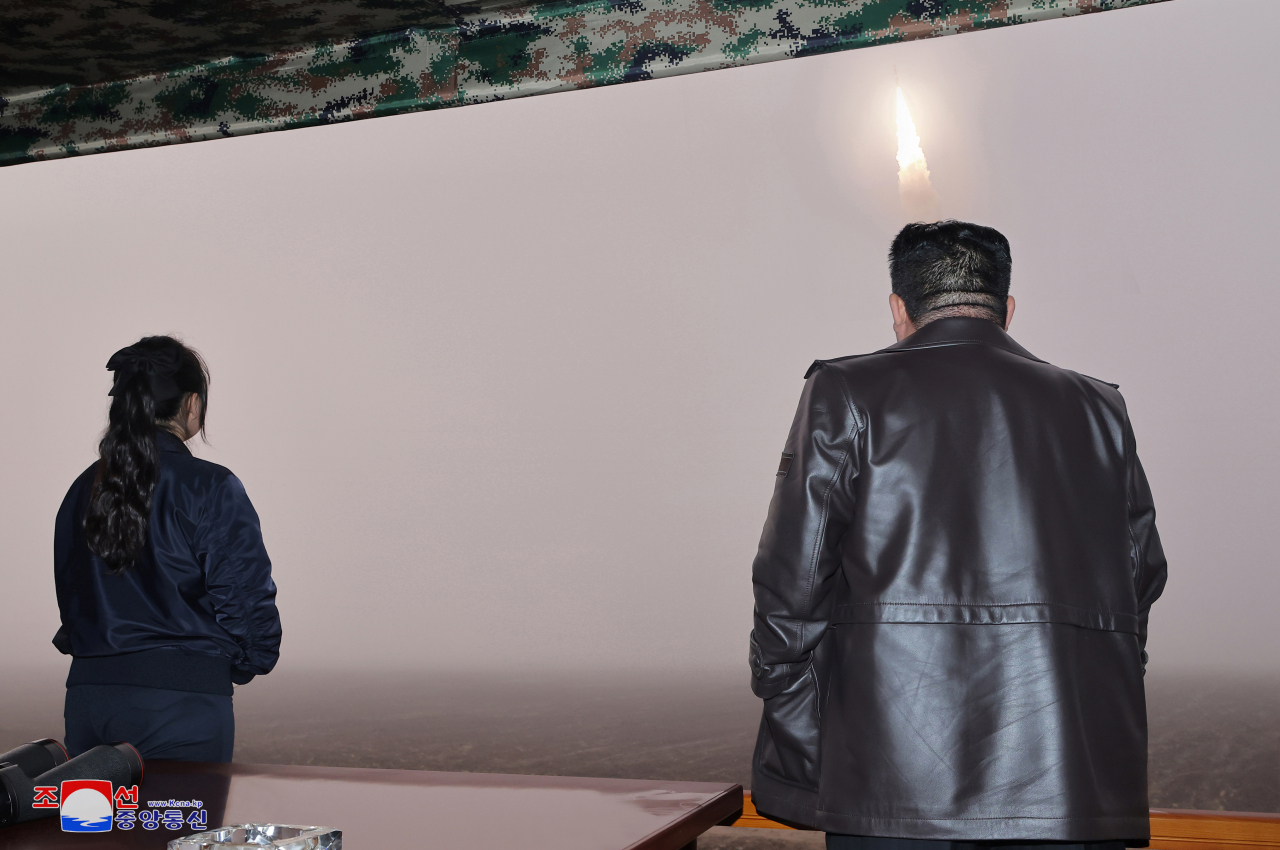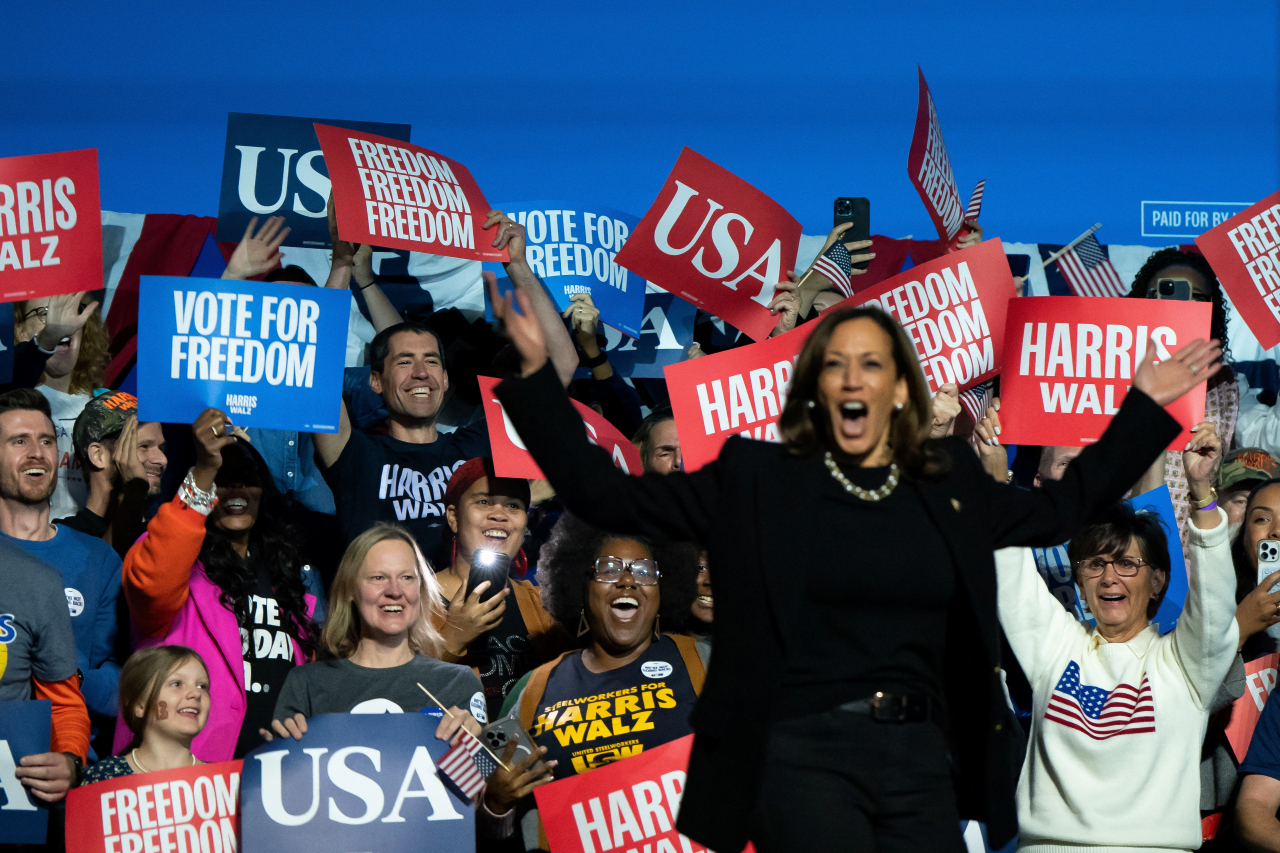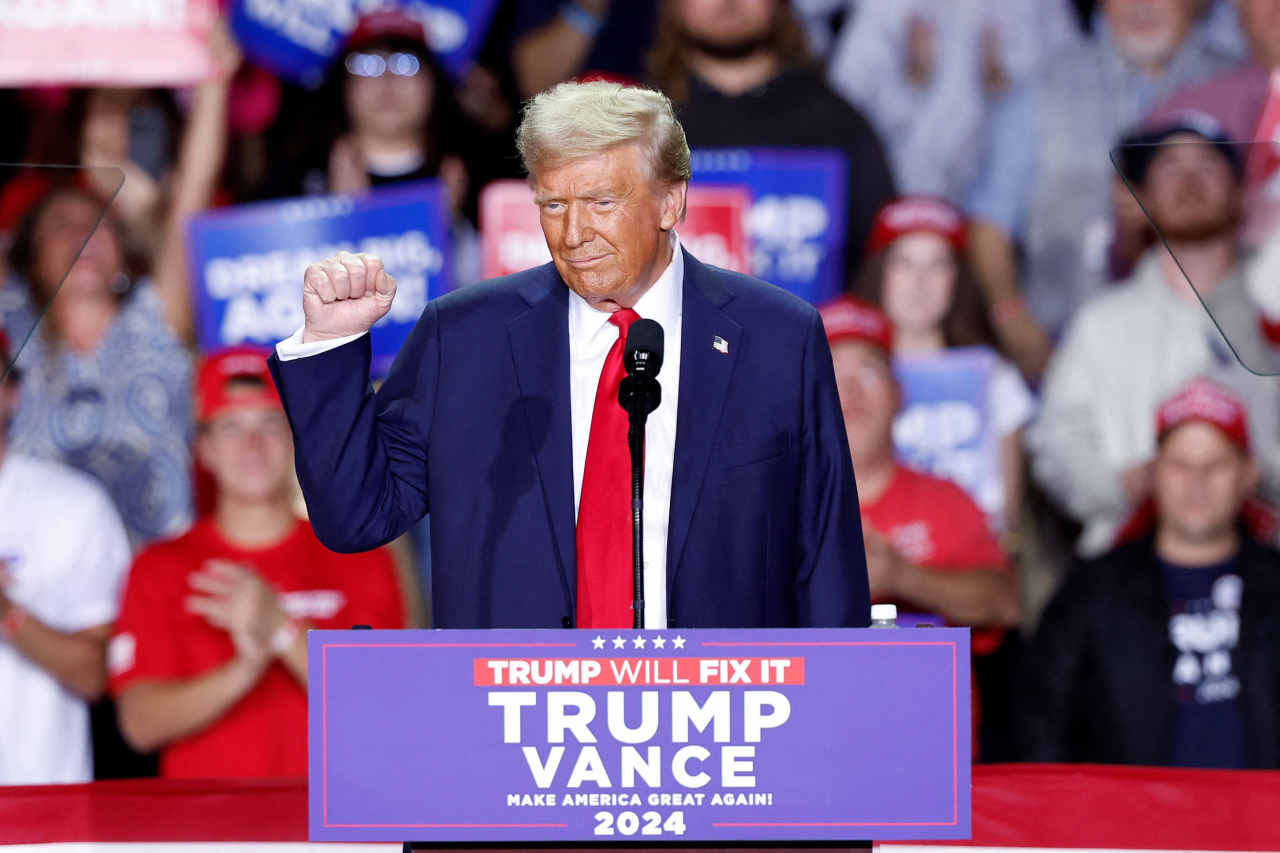 |
This combination of pictures shows former US President and Republican presidential candidate Donald Trump (left) arrives to speak at a campaign rally at the PPL Center in Allentown, Pennsylvania, on Oct. 29 and US Vice President and Democratic presidential candidate Kamala Harris (right) speaks during a campaign rally in Charlotte, North Carolina, on Nov. 2. (AFP) |
On the day of the US presidential election between Vice President Kamala Harris and former President Donald Trump, North Korea fired a salvo of ballistic missiles on Tuesday in an apparent message to Washington -- a continuation of its unrelenting saber-rattling, which included the launch of an intercontinental ballistic missile last week.
Escalating tensions further, Kim Yo-jong, the influential sister of North Korean leader Kim Jong-un, released a forceful English-language statement on US Election Day, which observers interpreted as an attempt to gain the upper hand over the incoming US administration.
"The line of bolstering up the self-defensive nuclear deterrent, being pursued by the Democratic People's Republic of Korea, is the most correct, one and only choice made by it in the current situation, and we will never vacillate in that way," Kim's sister said, referring to North Korea by its official name.
Hong Min, a senior research fellow at the Seoul-based Korea Institute for National Unification, said that North Korea’s recent missile launches and Kim Yo-jong’s statement conveyed a message to Washington, “asserting the legitimacy of its path to strengthen nuclear capabilities as a necessary response to its perceived threat from the US.”
"This is a message to the next US administration, potentially signaling a willingness to escalate tensions on the Korean Peninsula if Trump wins the election. Conversely, it may be aimed at encouraging a distinct approach from Biden’s North Korea policy should Harris take office."
As the US presidential election unfolds, Seoul’s attention is sharply focused on the outcome, particularly as North Korea ramps up its provocations -- including an unprecedented release in September of photographs revealing uranium enrichment facilities capable of producing weapons-grade material -- aimed at the incoming US administration.
With North Korea deploying troops to support Russia on Ukrainian battlefields, a South Korean presidential official, speaking on condition of anonymity, remarked on Tuesday, "The outcome of the US presidential election could influence not only the course of the war in Ukraine but could also thereby reshape security dynamics on the Korean Peninsula."
Harris and Trump represent profoundly divergent approaches to North Korea nuclear issues, the US-South Korea alliance, and the US defense commitment to its treaty-bound ally, South Korea, in the face of existential threats from North Korea.
 |
North Korean leader Kim Jong-un (right) and his daughter Kim Ju-ae observe the firing of the new Hwasong-19 intercontinental ballistic missile conducted on Oct.31 in this photo carried by North Korea's state-run Korean Central News Agency the following day. (Yonhap) |
Top-down vs. bottom-up
Trump and Harris notably embody fundamentally different views on how to engage with the North Korean leader -- a distinction that could profoundly influence whether either would seek a direct, top-down approach with Kim Jong-un to address the nuclear standoff.
Trump continued to boast that his friendship with Kim Jong-un, who possesses numerous nuclear weapons, had done no harm and actually made the world safer.
In August, at a campaign rally in Pennsylvania -- a crucial battleground state -- Trump described "getting along" with Kim as a "good thing." In July, Trump said during a campaign rally, "North Korea has a lot of nuclear weapons. I got along with them great. You were never in danger with me as your president."
During his first term, Trump pursued a top-down approach to resolving North Korea nuclear issues, engaging in personal meetings with Kim Jong-un on three occasions in 2018 and 2019, including the summit in Hanoi, Vietnam that abruptly collapsed.
Harris has repeatedly criticized Trump for his personal rapport with Kim, whom she has referred to as a “dictator,” including during the candidates' televised debate in September, suggesting that such interactions risk legitimizing Kim’s leadership.
In her nomination acceptance speech in Chicago in August, Harris declared, “I will not cozy up to tyrants and dictators like Kim Jong-un, who are rooting for Trump.”
The 2024 Democratic Party platform also read, “Trump took a different approach in the region, embarrassing the United States on the world stage including by flattering and legitimizing Kim Jong-un, exchanging 'love letters' with the North Korean dictator.”
The Institute for National Security Strategy, affiliated with South Korea’s intelligence agency, stated in a report issued in September that the Harris camp "clearly demonstrates a shift toward viewing the North Korean nuclear issue more in terms of management rather than outright resolution," pointing to the omission of denuclearization from the Democratic platform.
“In contrast, Trump’s camp continues to approach the issue as one that can be resolved. The omission of the North Korean nuclear issue from the Republican platform likely aims to give Trump greater flexibility in shaping his North Korea policy if reelected,” the report noted.
In a similar manner to his approach to North Korea, Trump claims he can swiftly end the Ukraine war through negotiations, citing his personal rapport with Russian President Vladimir Putin, though without offering any specific plans.
 |
Supporters of Democratic presidential nominee US Vice President Kamala Harris react as Harris walks on stage during a campaign rally at Carrie Blast Furnaces National Historic Landmark, in Pittsburgh, Pennsylvania on Nov.4. (Reuters) |
Value-based alliance
The Democratic Party platform, instead, emphasized an approach centered on working alongside allies to “counter the threat posed by North Korea’s destabilizing development of nuclear and missile programs” and underscored the importance of strengthening trilateral cooperation with South Korea and Japan as a strategy to maintain peace and stability on the Korean Peninsula and beyond.
In a piece for Yonhap New Agency, Harris emphasized the South Korea-US alliance as a “linchpin” of security and prosperity in the Indo-Pacific and globally, highlighting Seoul’s “sizable” contributions to the maintenance of the 28,500 US Forces Korea.
The Democratic Party's foreign policy goal is "strengthening American leadership worldwide" by reinforcing its alliances in the Indo-Pacific and Europe and the connections among its allies, such as by inviting Indo-Pacific allies to NATO Summits, according to the party platform.
The party platform underlines the importance of meeting challenges from China and Russia by "leading coalitions of nations who share our values to stand together."
Harris underscored that "standing with our friends and defending our ideals against tyranny has helped make America the most powerful and prosperous nation in the world" during her meeting with Ukraine's President Volodymyr Zelenskyy in September.
"We must defend our democratic values and stand up to aggressors. And we must stand for international order, rules and norms," Harris said, highlighting that Ukraine’s fight matters to Americans because principles are at stake.
 |
Former US President and Republican presidential candidate Donald Trump speaks during a campaign rally at Van Andel Arena in Grand Rapids, Michigan on Nov. 5. (AFP) |
'America First'
Under the banner of his "America First" policy, Trump has taken a transactional approach to alliances, pressing for greater burden-sharing among US partners.
Trump has been vocal in criticizing NATO members for "free-riding" and has pushed for significantly higher defense contributions from allies like South Korea and Japan.
“If I were there now, they’d be paying us $10 billion a year. And you know what? They’d be happy to do it,” Trump remarked during an interview at the Economic Club of Chicago in October, labeling South Korea a “money machine.”
“We have 40,000 troops in harm’s way, very serious, because you have North Korea’s very serious power. They have tremendous nuclear power,” Trump said, inaccurately representing the scale of US forces in South Korea, and criticizing incumbent President Joe Biden for allegedly reducing South Korea's share of its defense costs.
The Republican 2024 party platform touted a "return to peace through strength," which will "promote a Foreign Policy centered on the most essential American Interests."
The party platform also underscored that "Republicans will strengthen Alliances by ensuring that our Allies must meet their obligations to invest in our Common Defense."
South Korea's Principal Deputy National Security Adviser Kim Tae-hyo warned in September that a Trump victory in this election "could lead to a weakening of the US security umbrella," referring to the US extended deterrence commitment.
"There is a possibility that the US might push for cost-based negotiations over the deployment of strategic assets to South Korea," Kim added.
Kim however concurrently noted potential opportunities for South Korean defense companies to enter the US market, driven by increased American defense spending.
"With both crisis and opportunity coexisting in extreme forms, a bolder and more sophisticated strategy is required," Kim said.







![[Herald Interview] How Gopizza got big in India](http://res.heraldm.com/phpwas/restmb_idxmake.php?idx=644&simg=/content/image/2024/11/20/20241120050057_0.jpg)